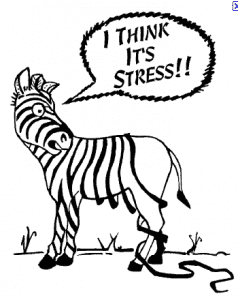 I field a lot of questions about stress during my programs. I think this is, in part, because of how pervasive stress is in the lives of anyone involved in an emergency situation and the role that stress plays in situational awareness and decision making. So I thought I’d write an article about stress. Well, as it turns out, when I was making the outline I came to the realization that I am on the cusp of another multi-segment topic. There’s just too much information to cover in a single article.
I field a lot of questions about stress during my programs. I think this is, in part, because of how pervasive stress is in the lives of anyone involved in an emergency situation and the role that stress plays in situational awareness and decision making. So I thought I’d write an article about stress. Well, as it turns out, when I was making the outline I came to the realization that I am on the cusp of another multi-segment topic. There’s just too much information to cover in a single article.
We cannot eliminate stress in our lives. Nor should we try to. Stress is an essential component of human existence and critical to situational awareness and survival. In fact, stress plays a critical role in how people react to life threatening situations faced at emergency scenes. Stress can trigger some pretty amazing physical and mental skills. But stress can also inhibit your abilities. This series will look at human stress as we deal with emergency situations.
Maybe you’ve heard a folklore tale about a frail 90-pound grandma displaying super human strength and lifting a car to free a trapped victim. This same person might otherwise struggle to load a bag of groceries into the trunk of her car. How could she do this?
Suffice it to say, stress can evoke some extraordinary abilities. Universally, researchers agree, stress changes us physically, emotionally, and chemically. Stress can contribute to extraordinary performance. It can also be a significant inhibitor of your abilities. Let’s examine stress.
Stress
Stress causes the hypothalamus to stimulate the pituitary gland (a small, pea-sized organ in your brain). This excited glad subsequently starts chattering off messages to other organs and getting them excited. This gets the proverbial stress ball rolling. The excited organs dump boat loads of chemicals and hormones into the blood stream which can cause some pretty amazing changes in how you think and how you behave (remember, the grandma that lifted the car). Scientists have given your stress reaction a name. They call it the Fight or Flight Response and it impacts your performance as you deal with any stressful situation or emergency.
Kick butt or run away
 The Fight or Flight Response (sometimes called Fight or Flight Syndrome or Fight-Flight-Freeze Response) is a condition of hyper arousal triggered by chemical releases in the brain in reaction to stress. The response is considered to be hereditary. Anthropologists believe the response dates back to prehistoric days where your cave-dwelling relatives were routinely exposed to acute stress (mostly in the form of predators who saw them as lunch).
The Fight or Flight Response (sometimes called Fight or Flight Syndrome or Fight-Flight-Freeze Response) is a condition of hyper arousal triggered by chemical releases in the brain in reaction to stress. The response is considered to be hereditary. Anthropologists believe the response dates back to prehistoric days where your cave-dwelling relatives were routinely exposed to acute stress (mostly in the form of predators who saw them as lunch).
Your ancestral response to an impending threat was to: Fight it, run away from it, or to stand motionless in hopes the hungry carnivore would pass by without noticing. Hence, the Fight-Flight-Freeze nomenclature. Over eons of evolution, this response has become genetically ingrained into your DNA.
Hormones on the loose
Two of the many stress hormones coursing through your veins in reaction to stress include:
Adrenalin: Secreted by the Adrenal glands, Adrenaline triggers heart and lung reactions that engorge the muscles with oxygen-rich blood. In essence, it’s getting you physically ready to kick butt or run away.
Endorphins (a.k.a. endogenous morphine): Released by the pituitary gland, Endorphins mask pain by blocking nerve impulses at the spinal cord. It allows you to continue to fight or run away, even if you’re hurt (e.g., bitten by the predatory animal). Endorphins are stimulants.
The hormonal reaction
Hormones trigger several bodily changes, including:
- Heart rate increases
- Respiration increases
- Glucose (sugar) levels increase
- Morphine releases
- Pupil dilation
- Sweating
- Dry mouth
- Shaking
- Digestive activity decline (as blood supply is redirected to vital organs)
- Bowel and bladder content release
- Auditory exclusion
- Hyper vigilance
- Tunnel senses
- Intuitive decision making
- Sensory overload
Suffice it say, stress, is a game changer and for people involved in an emergency situation, the consequences can be catastrophic.
Thank you, in advance for coming along on this journey of this 8-part series to explore the impacts of stress. Topics we’ll discuss will include:
- Acute Stress
- Episodic Stress
- Chronic Stress
- Distress and Eustress
- Hyper vigilance
- Tunneled senses
- Auditory exclusion
- Information and sensory overload
- Time distortion
About the Author
Richard B. Gasaway, PhD, CSP is widely considered a trusted authority on human factors, situational awareness and the high-risk decision making processes used in high-stress, high consequence work environments. He served 33 years on the front lines as a firefighter, EMT-Paramedic, company officer, training officer, fire chief and emergency incident commander. His doctoral research included the study of cognitive neuroscience to understand how human factors flaw situational awareness and impact high-risk decision making.
_____________________________________________________

If you are interested in taking your understanding of situational awareness and high-risk decision making to a higher level, check out the Situational Awareness Matters Online Academy.
CLICK HERE for details, enrollment options and pricing.
__________________________________
Share your comments on this article in the “Leave a Reply” box below. If you want to send me incident pictures, videos or have an idea you’d like me to research and write about, contact me. I really enjoy getting feedback and supportive messages from fellow first responders. It gives me the energy to work harder for you.
Let’s Get connected
Facebook: SAMatters
LinkedIn: Rich Gasaway
LinkedIn: Situational Awareness Matters
Twitter: Rich Gasaway
Youtube: SAMattersTV
itunes: SAMatters Radio
Stitcher Radio: SAMatters Radio
Google Play: SAMatters Radio
iHeart Radio: SAMatters Radio

Pingback: Stress: The Nemesis of Situational Awareness | Situational Awareness Matters!™
Rich,
I really enjoyed your simple concise explanation of the physiological/ behavioral stress response.
Dr. Beth,
Thanks for the kind words and for your support of SAMatters! Keep up your great work with firefighters.
Rich
Pingback: Radio Messaging Under Warlike Conditions - Fire Engineering